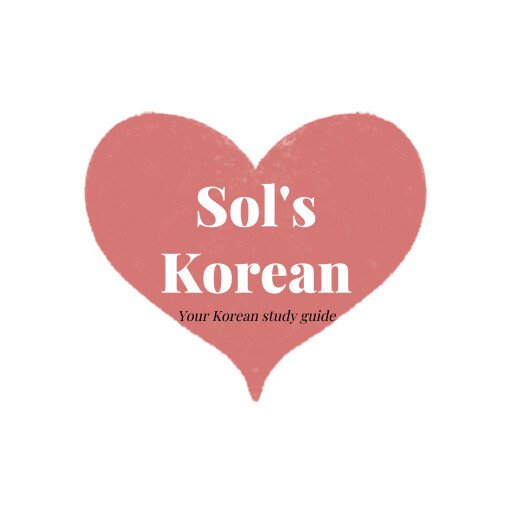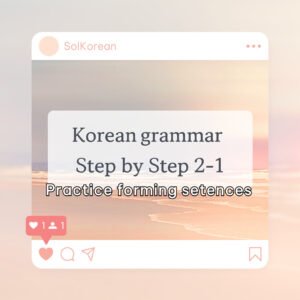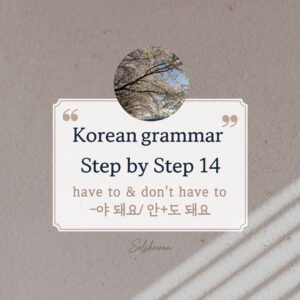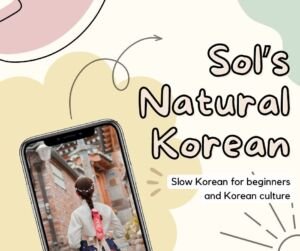Korean listening practice #19 Habits
Welcome to Part 19 of our Korean listening practice series!
Today, we’ll focus on expressions related to habits that I maintain: drinking water, walking consistently, and studying Korean whenever you have spare time. You’ll learn heaps of new vocabulary and expressions related to daily life!
Let’s dive in together!
<How to study>
1. Get to know important vocab.
2. Watch the video without subtitles initially, then review with subtitles.
3. If you don’t understand grammar points, read through my explanations!
4. Listen repeatedly and mimic the speaker. Aim to listen at least once daily until you’re comfortable with the sentence structures and expressions.
Vocabulary list
| 지키다 | to keep, protect |
| 사소하다 | small, petty |
| 씩 | each, every |
| 청소하다 | to clean |
| 충분하다 | to be enough |
| 엄청 | very, really |
| 더럽다 | to be dirty |
| 시간(을) 들이다 | to spend time, take time |
| 깨끗하다 | to be clean |
| 능률 | efficiency |
| 건강하게 | healthy |
| 튀기다 | to fry |
| 최소한 | at least, as little as possible |
| 덜 | less |
| 과자 | snack |
| 설탕 | sugar |
| 소금 | salt |
| 배달 | delivery |
| 돈(을) 아끼다 | to save money |
| 피부 | skin |
| 근처 | near |
| 눈 | eye |
| 움직이다 | to move |
| 걷다 | to walk |
| 걸어다니다 | walking as a habitual or repetitive action |
| 몸 | body |
| 계단 | stairs |
| 올라가다 | to go up |
| 짧다 | short |
| 거리 | distance |
| 어떤 | any |
| 아무것도 | anything, nothing |
| 누구나 | anybody, everyone |
| 휴식 | rest |
| 필요하다 | need |
| 기분 | feeling, mood |
| 틈틈이 | Whenever I have spare time |
| 기회 | opportunity |
| 생기다 | to occur, arise |
| 이점 | benefit |
| 친구(를) 사귀다 | to make friends |
Put your best effort into understanding the video as you listen.
And remember to mimic it too!
This practice will aid in cultivating a natural Korean accent and tone.
(The script is down below!)
<Script>
내가 지키는 사소한 습관들
the little habits I keep
첫째, 매일 10분씩 청소하기.
First, cleaning for 10 minutes every day.
10분은 청소를 하는데 충분해요.
Ten minutes is enough for cleaning.
엄청 더러워 질 때까지 기다리고 청소하는 것 보다, 매일 조금씩 시간을 들여서 청소를 해 보세요.
Rather than waiting until it gets really dirty and cleaning, spend a little time cleaning every day.
집이 깨끗해지면, 일이나 공부의 능률도 올라가요!
When your house gets clean, the efficiency of your work and study goes up!
둘째, 건강하게 먹기.
Second, eat healthy.
최소한 튀긴 음식을 덜 먹고, 야채를 많이 먹으려고 해요.
I try to eat as little fried food as possible and a lot of vegetables.
과자대신 과일을 먹어봐요.
Try eating fruit instead of snacks.
설탕이나 소금도 많이 안 먹는 게 좋아요.
It’s better not to eat a lot of sugar or salt, either.
배달 음식은 가끔 먹어요.
I eat delivery food sometimes.
집에서 요리하는 게 더 건강해요.
Cooking at home is healthier.
돈도 아낄 수 있어요.
You can also save money.
셋째, 물 많이 마시기.
Third, drink a lot of water.
매일 2리터씩 물을 마시는 것이 좋대요.
It’s said that it’s good to drink 2 liters of water every day.
피부도 좋아질 거예요.
Your skin will get better, too.
물을 자주 마시기 위해, 물병을 근처에 두세요.
In order to drink water often, put a water bottle nearby.
눈 앞에 물이 보이면, 더 자주 마시게 될 거예요.
If you see water in front of your eyes, you will drink it more often.
넷째, 많이 움직이기.
Fourth, move a lot.
자주 걷고 자주 몸을 움직이려고 하세요.
Try to walk often and move your body often.
엘레베이터 대신 계단으로 올라가고, 짧은 거리는 걸어다녀보세요.
Go up the stairs instead of the elevator, and walk around for a short distance.
운동도 꾸준히 하면 좋아요.
It’s also good if you exercise consistently.
다섯째, 하루 10분 책 읽기.
Fifth, reading a book for 10 minutes a day.
아침에 일어나서나 자기 전에, 짧게라도 책을 10분 읽어 보세요.
After getting up or before going to sleep,
at least briefly, try reading a book for 10 minutes.
어떤 책이든 괜찮아요.
Any book is fine.
여섯째, 가끔씩은 쉬기.
Sixth, take a break from time to time.
가끔은 아무것도 안 하고 쉬어도 돼요.
Sometimes it’s okay not to do anything and rest.
우리는 누구나 휴식이 필요해요.
Everyone needs a break.
친구도 만나고, 혼자 여행도 가 보세요.
Meet your friends and go on a trip alone.
기분이 좋아질 거예요.
You’ll feel better.
마지막, 한국어 공부 틈틈이 하기!
Lastly, study Korean whenever you have spare time!
언어를 배우면 더 많은 기회가 생겨요.
If you learn languages, more opportunities will arise.
한국어나 다른 언어를 배우면, 이점이 많을 거예요.
If you learn Korean or other languages, there will be many benefits.
다양한 외국인 친구들도 쉽게 사귈 수 있어요.
You can easily make various foreign friends.
시간이 나면 다른 언어를 자주 공부해보세요!
If you have time, study other languages often!
<Explanations>
내가 지키는 사소한 습관들
* 는is “that” in the present tense. Keep in mind the order.
Small habits that I do = 내가 하는 사소한 습관들 (하다 to do + 는 in the present tense)
첫째, 매일 10분씩 청소하기
* “씩” emphasizes the regularity or frequency of an action. For more details, check out here!
* “기” is used to change verbs to a noun form. When writing a list, the 기 ending is commonly used.
10분은 청소를 하는데 충분해요.
* Here, 는데 is often used to indicate duration of time. We typically use 는데 with the verb 걸리다(to take (time))
집까지 가는데 30분 걸려요: It takes 30 minutes to get home.
서울까지 가는데 차로 2시간 걸려요: It takes 2 hours to Seoul by car.
숙제하는데 20분이면 돼요: 20 minutes are okay(enough) to do homework.
엄청 더러워 질 때까지 기다리고 청소하는 것 보다, 매일 조금씩 시간을 들여서 청소를 해 보세요.
* ‘지다‘ is used to indicate a change of state, typically translated as ‘have become’ in English. ‘때’ means ‘when,’ and ‘까지’ means ‘until’ or ‘by.’ So, it means ‘until when it becomes dirty.’
* 보다 means than!
* Here’s another usage of “씩“, meaning little by little. for more details, check out here!
* 시간을 들이다 means ‘to take time.’ Here, I use the 아서/어서/해서 grammar to mean ‘and,’ as in ‘to take time and try to clean.’
* The grammar ‘보다‘ has the meaning of ‘try to’ as a suggestion. For example, 케이크 먹어 보세요 means ‘Try to eat this cake’ as a suggestion.
집이 깨끗해지면, 일이나 공부의 능률도 올라가요!
* 지다 + 면, which means “if the house becomes clean.”
* (이)나 is used to mean ‘or’ with nouns. For verbs, we use ‘거나’. For example: ‘자거나 쉬어요’ (I sleep or rest).
둘째, 건강하게 먹기
* For ordinal numbers like first, second, and third, we use native Korean numbers. The first is ‘첫째’, and after that, you can use the native number followed by ‘째’. For example: ‘둘째’ (second), ‘셋째’ (third), ‘넷째’ (fourth).
최소한 튀긴 음식을 덜 먹고, 야채를 많이 먹으려고 해요.
* 최소한 means “as little as possible”, but it has several more meanings; you can check out my post here!
* (으)려고 하다 grammar, meaning “Try to, plan to”
과자대신 과일을 먹어봐요.
* 대신 means “instead of”, 나 대신 너가 가. (Instead of me, you go).
When using with verbs, we add “는” in front. 밥 먹는 대신, 잘래요. (Instead of eating, I’ll sleep.) 집에 가는 대신, 카페에 갈래요.(Instead of going home, I’ll go to a cafe.)
* The grammar ‘보다‘ has the meaning of ‘try to’ as a suggestion.
설탕이나 소금도 많이 안 먹는 게 좋아요.
* 게 is an abbreviation of 것 + 이.
배달 음식은 가끔 먹어요.
집에서 요리하는 게 더 건강해요.
* 게 is an abbreviation of 것 + 이.
돈도 아낄 수 있어요.
* ㄹ/을 수 있어요: can, be able to
셋째, 물 많이 마시기.
매일 2리터씩 물을 마시는 것이 좋대요.
* “씩” emphasizes the regularity or frequency of an action.
*Reporting Statements (다고 해요 → 대요). 대요 is used to report something someone else has said in a statement form.
피부도 좋아질 거예요.
* 지다: used to indicate a change of state
물을 자주 마시기 위해, 물병을 근처에 두세요.
* 기 위해 means “in order to”, we have similar grammar (으)려고 to indicate the purpose of actions, but (으)려고 is more commonly used than 기 위해. -기 위해(서) can be translated as “in order to” or “for the sake of doing” in English. So when you use 기 위해(서), you are more focused on the action itself(in this case, drink water often) than 물병을 근처에 두세요.
Take a look at these 2 examples:
엄마랑 얘기하려고, 한국어 공부해요 : I study Korean to talk with my mom
엄마랑 얘기하기 위해, 한국어 공부해요 : I study Korean in order to talk with my mom (The focus is “to talk to my mom” rather than “study Korean”, we focus on the action itself)
눈 앞에 물이 보이면, 더 자주 마시게 될 거예요.
* 게 되다: end up ~ing.
좋아하게 될 거예요: you will end up liking.
한국어를 계속 공부하면, 잘 하게 될 거예요: If you keep studying Korean, you will end up being fluent.
넷째, 많이 움직이기.
자주 걷고 자주 몸을 움직이려고 하세요.
* 려고 하다(try to) + (으)세요(suggestion)
엘레베이터 대신 계단으로 올라가고, 짧은 거리는 걸어다녀보세요.
* “걷다” is a general term for walking, while “걸어다니다” implies walking as a habitual or repetitive action, often suggesting movement within a certain area or space.
운동도 꾸준히 하면 좋아요.
다섯째, 하루 10분 책 읽기.
아침에 일어나서나 자기 전에, 짧게라도 책을 10분 읽어 보세요.
* 일어나서나: 일어나다 + 아/어/해서 (and) + 나(or), which essentially means ‘after getting up or.’ We take “일어나서” as a noun word, so we used 나(or) here. While this may seem unconventional in English, it’s a construct that has become natural for us in Korean, as we often take actions immediately after waking up. You can simply memorize the form of “일어나서.” as a word, meaning “after getting up”
* (이)라도: even if, at least.
– 이거라도 드세요 “Please have at least this” in this context emphasizes the idea of “at least” or “even if it’s just this”.
– 밥이 없으면 빵이라도 먹어요. “If there’s no rice, eat bread at least.”
– 짧게라도 걷는게 좋아요 “It’s good to walk, even if briefly.”
어떤 책이든 괜찮아요.
* (이)든: whether… or
Verb/Noun + (이)든 : 가든 안 가든 상관 없어(It doesn’t matter whether to go or not)
빵이든 바나나든 괜찮아; I’m okay either bread or banana.
여섯째, 가끔씩은 쉬기.
가끔은 아무것도 안 하고 쉬어도 돼요.
* (아/어/해)도 + 돼요: “may,” “can,” “is allowed to,” or “is okay to.”
가도 돼요: you can go. you are allowed to go. it’s okay to go
여기 앉아도 돼요: you may sit here. It’s allowed to sit here.
전화해도 돼요: You can call. It’s okay to call
우리는 누구나 휴식이 필요해요.
* “누구나” means “everyone” or anyone.” For example, “누구나 참여할 수 있어요,” it translates to “”Anybody/Everybody can participate.” Another synonym for “anyone” is “아무나,” which is used more frequently for “anyone.” These terms are interchangeable.
친구도 만나고, 혼자 여행도 가 보세요.
기분이 좋아질 거예요.
마지막, 한국어 공부 틈틈이 하기!
* 틈틈이 is a word that doesn’t directly translate into English, but it can be understood as “whenever you have spare time” or “bit by bit.”
틈틈이 단어를 외우세요 : Memorize vocabulary whenever you have spare time.
틈틈이 계획을 만드세요: Make a plan bit by bit whenever you have extra time.
언어를 배우면 더 많은 기회가 생겨요.
* 생기다 is a versatile verb, it means “To arise or occur”, “To have (an emotion, feeling)”
문제가 생겼어요: A problem arose.
새로운 기회가 생겼어요: A new opportunity has arisen.
불안감이 생겼어요: I started to feel anxious.
한국어나 다른 언어를 배우면, 이점이 많을 거예요
* (이)나 : or (for nouns). 이거나 그거나 다 똑같아요: This or that, it’s all the same.
다양한 외국인 친구들도 쉽게 사귈 수 있어요.
* ㄹ/을 수 있어요: can, be able to
시간이 나면 다른 언어를 자주 공부해보세요!
<Korean script>
내가 지키는 사소한 습관들
첫째, 매일 10분씩 청소하기.
10분은 청소를 하는데 충분해요.
엄청 더러워 질 때까지 기다리고 청소하는 것 보다, 매일 조금씩 시간을 들여서 청소를 해 보세요.
집이 깨끗해지면, 일이나 공부의 능률도 올라가요!
둘째, 건강하게 먹기.
최소한 튀긴 음식을 덜 먹고, 야채를 많이 먹으려고 해요.
과자대신 과일을 먹어봐요.
설탕이나 소금도 많이 안 먹는 게 좋아요.
배달 음식은 가끔 먹어요.
집에서 요리하는 게 더 건강해요.
돈도 아낄 수 있어요.
셋째, 물 많이 마시기.
매일 2리터씩 물을 마시는 것이 좋대요.
피부도 좋아질 거예요.
물을 자주 마시기 위해, 물병을 근처에 두세요.
눈 앞에 물이 보이면, 더 자주 마시게 될 거예요.
넷째, 많이 움직이기.
자주 걷고 자주 몸을 움직이려고 하세요.
엘레베이터 대신 계단으로 올라가고, 짧은 거리는 걸어다녀보세요.
운동도 꾸준히 하면 좋아요.
다섯째, 하루 10분 책 읽기.
아침에 일어나서나 자기 전에, 짧게라도 책을 10분 읽어 보세요.
어떤 책이든 괜찮아요.
여섯째, 가끔씩은 쉬기.
가끔은 아무것도 안 하고 쉬어도 돼요.
우리는 누구나 휴식이 필요해요.
친구도 만나고, 혼자 여행도 가 보세요.
기분이 좋아질 거예요.
마지막, 한국어 공부 틈틈이 하기!
언어를 배우면 더 많은 기회가 생겨요.
한국어나 다른 언어를 배우면, 이점이 많을 거예요
다양한 외국인 친구들도 쉽게 사귈 수 있어요.
시간이 나면 다른 언어를 자주 공부해보세요!
<English script>
the little habits I keep
First, cleaning for 10 minutes every day.
Ten minutes is enough for cleaning.
Rather than waiting until it gets really dirty and cleaning, spend a little time cleaning every day.
When your house gets clean, the efficiency of your work and study goes up!
Second, eat healthy.
I try to eat as less fried food as possible and a lot of vegetables.
Try eating fruit instead of snacks.
It’s better not to eat a lot of sugar or salt, either.
I eat delivery food sometimes.
Cooking at home is healthier.
You can also save money.
Third, drink a lot of water.
It is good to drink 2 liters of water every day.
Your skin will get better, too.
In order to drink water often, put a water bottle nearby.
If you see water in front of your eyes, you will drink it more often.
Fourth, move a lot.
Try to walk often and move your body often.
Go up the stairs instead of the elevator, and walk around for a short distance.
It’s also good if you exercise consistently.
Fifth, reading a book for 10 minutes a day.
After getting up or before going to sleep,
at least briefly, try reading a book for 10 minutes.
Any book is fine.
Sixth, take a break from time to time.
Sometimes it’s okay not to do anything and rest.
Everyone needs a break.
Meet your friends and go on a trip alone.
You’ll feel better.
Lastly, study Korean whenever you have spare time!
If you learn languages, more opportunities will arise.
If you learn Korean or other languages, there will be many benefits.
You can easily make various foreign friends.
If you have time, study other languages often!
You can also find this on Spotify/Apple Podcasts.
Listen to it frequently whenever you have some spare time.
Listening is a crucial aspect of learning Korean, serving as one of the most effective methods when combined with speaking (mimicking) and writing. By integrating these skills, you can enhance your understanding and fluency in the language.
Throughout my blog, you’ll discover a wealth of useful materials to support your learning journey.
So, don’t hesitate to explore and take advantage of the resources available here.
Remember, consistent practice and exposure to Korean will lead to significant progress.
Keep up the great work, and enjoy your learning adventure!
If you’re looking to study grammar, feel free to visit here!
For additional resources, visit my YouTube channel too!







